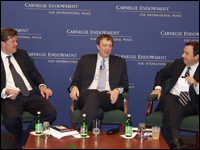Registration
You will receive an email confirming your registration.
IMGXYZ886IMGZYXWith the collapse of the Soviet Union, the fall of the Berlin Wall, and the deregulation of international financial markets in 1989, governments and entrepreneurs alike became intoxicated by forecasts of limitless expansion into newly open markets. No one would foresee that the greatest success story to arise from these events would be the globalization of organized crime. Current estimates suggest that illegal trade accounts for nearly one-fifth of global GDP.
On April 17, 2008, the Carnegie Endowment hosted a discussion with authors Misha Glenny and Ron Suskind on the publication of Glenny’s new book McMafia: A Journey Through the Global Criminal Underworld. Glenny described the confluence of the collapse of communism, rise of globalization, and opportunism of organized crime as the source of exponential growth in the global shadow economy starting in the early 1990s. Bulgaria is a prime example where state collapse led to high unemployment and low regulation allowed criminal groups to define the new rules of the economic exchange. The globalization of crime during this period was behind the diversion of Colombian cocaine to Western Europe through its Eastern front and of excess criminal capital to Africa to fuel resource-based wars.
In the Balkans, the imposition of an arms embargo in 1990 helped to turn the former Yugoslavia into a major transit point for the trafficking of weapons, cocaine, women, and untaxed cigarettes. Smuggling took place with the collusion of each of the respective political leaderships in order to fund the Balkan wars. At the same time, in Russia the acquisition of wealth by the oligarchs was dependent upon their protection rackets. Post-Soviet capitalism was birthed out of the often violent forms of dispute resolution among the Russian mafia.
The high profitability of the global shadow economy is rooted in the huge demand in the West for prostitution, narcotics, illegal migrant labor, and counterfeit goods. The various elements of global crime—including terrorism—are connected, but have not received adequate attention or been addressed comprehensively by policymakers. The 15 to 20 percent of the global economy that composes the shadow economy (inclusive of corruption, tax evasion, and corporate fraud) are the very drivers of social instability. The opium trade in Afghanistan alone poses an existential threat to the North Atlantic Treaty Organization.
Carnegie Vice President for Studies–Russia, China, and Eurasia Mark Medish introduced the event.
